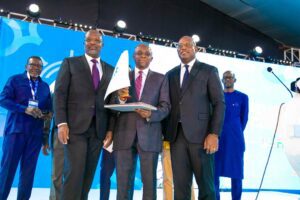
ETO Call-Up System failure: NPA blames truck drivers, freight forwarders, TTP
By Seun Ibiyemi
The Nigerian Ports Authority (NPA) has blamed truck drivers, freight forwarding community, as well as its consultant; Truck Transit Park Limited (TTP) for the hiccups and failures of the ETo Callup system, an electronic system introduced to ensure free flow of trucks in and out of the ports.
Speaking at a Townhall meeting organised by National Association of Government Approved Freight Forwarders (NAGAFF) in partnership with Association of Maritime Truck Owners (AMATO) during the week, NPA Apapa Port Manager, Mr Charles Bamidele Okaga said the Eto Call-Up system is a sophisticated solution that has worked in advanced countries but failed in Nigeria due to insincerity and the Nigerian factor.
Speaking at the Townhall meeting tagged, “Towards Promoting and Enhancing Traffic Sanity, Orderliness Along Port Access Corridors in Lagos Nigeria,” the NPA port manager also claimed that extortion on the port access road has stopped.
On the ETO call-up system, Mr Okaga said, “The concept worked from inception, but after sometime, because the operator of the facility (TTP) is a Nigerian, the enforcement teams are Nigerians, the truck drivers are Nigerians, the park owners are Nigerians, so Nigerians came into electronic callup system and we begin to have confusion all over the place.
“The system we are using is an ‘Oyinbo’ system, can we please start behaving the way the Oyinbo man would behave and everything would work well, I can tell you today that, if we all agree to key into the policy, it would work well and nobody would have any issues. If we all agree to be orderly, it would get to everybody’s turn in good time.
“Now, because we are Nigerians, the man with 200 trucks wants all the trucks to enter the port at once, while the man with one truck is not able to enter the port.
“A single truck would have five plate numbers and all the five numbers are on the ETO system, how then do we have accurate data of the number of trucks we are having?
“Government is also at fault, the road starts breaking down until it becomes a big problem and the Government would not respond to it. So, if we all decide to play our roles, we would have a better situation.
“NPA has an MSS sticker that should ordinarily authenticate your ownership and clearance to go into the port, but people refused to stick it to their truck, so, the essence of introducing it was defeated.
“The E-Tag that TTP is planning, in as much as we stick it on our windshield, would the same thing that happened to the NPA sticker not happen to it?
“TTP does not need approval before commencing the implementation of E-Tag. Our worry is that since approval is being sought, we hope it would be of no additional cost.
“For NPA, we are checking the sensitivity of anything that would increase the cost of doing business, even if it is by 1kobo. This is what led to the slight delay in the approval of E-Tag, because the solution is supposed to be comprehensive.
“Our appeal to Truckers is that they should endeavour to obey the rules. Truckers would leave the port with imports and line up on the whole of Creek Road, and they would complain of extortion. The access road is not a parking space, you have to go back to the park you were called from.
“On the issue of extortion on the port corridor, Truckers would also agree that extortion has stopped since the roads became clear. It is evidence that once there is chaos, people would want to profit from it,” he said.
Mr Okaga also noted that the NPA has introduced three days validity for trucks which have left the parks to the pre-gate.
He however said that truckers are complaining that the three days are insufficient. He urged Truckers to come forward with genuine evidence or reports on why the three days is not enough. He lampooned the gathering of truckers saying that many of them are insincere in their dealings.
According to him, “The TTP on paper would release 500 trucks from parks to pre-gate, but physically we would only see 150 trucks, you have to talk to yourselves, when people who don’t have business to do, people who are speculators looking for tickets to sell, they find themselves into our community, making it difficult for people with legitimate businesses to do their businesses, fake numbers have blocked the access to the port.
“All the parks have capacity, but on paper, TTP would say the park is full, meanwhile on physical verification, the park is not full.
“We are also appealing to truckers to write their numbers on their trucks, this would stop fraudsters from hijacking your cargoes before you arrive at the port.
“The NPA is still not getting enough cooperation from the truckers,” he said.



